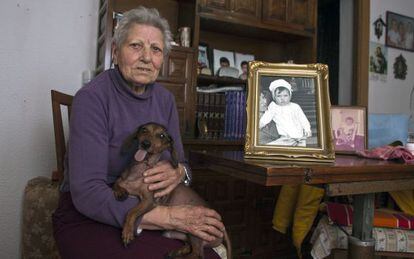Mother risks indictment to tell truth
A daughter's stolen baby lawsuit brings her adoptive parent to court Declaration of 90-year-old is key to notorious doctor being subpoenaed to testify


At the age of almost 90, Inés Pérez attended a hearing in an Almería court to answer questions about the adoption of her daughter, who she collected from the now-notorious and defunct San Ramón clinic in Madrid in 1969. Her own daughter, Inés Madrigal, had included Pérez in her report of a stolen babies case, convinced that she had been taken from her biological parents after birth and that the testimony of her adoptive mother would help the case to advance. She assumed Pérez's age would preclude any criminal action being taken against her. "I knew we ran the risk that she would be indicted, but I spoke to her and she told me to go ahead, to do what I needed to do."
Most of the open cases of stolen babies do not count on the support of such direct testimony as that of Inés Pérez, who in 2011 told EL PAÍS that she had not given birth to her daughter, despite the records stating the opposite. She is one of the few such mothers that has dared to speak out.
"San Ramón called me one day and told me to come the next because they had a surprise for me. When I arrived, Doctor [Eduardo] Vela told me: 'look what a gift. I have a girl for you.' The priest, Félix Sánchez, told me that she was from a married woman who had got pregnant when her husband was out of town on business. They repeated several times that she was from Extremadura, as if that was something bad."
I was told how to fake being pregnant: to wear a cushion and feign nauseas..."
At that time Pérez worked as a volunteer at a convent where "widows or single mothers" would leave their children. Pérez took two of them in temporarily while hoping that one of the struggling mothers would renounce her child so that she could adopt, as she and her husband were unable to conceive. The chance of adopting a baby whose young mother was from a rich family was discussed.
"Her parents didn't want the child but the girl did," Pérez recalls. "The doctor even showed me how to fake pregnancy: he told me not to wear make-up, to feign nausea occasionally and wear a cushion to simulate the bump..."
That adoption scheme did not come off, but then Pérez was called about Inés. She was a premature baby. "Doctor Vela told me to put bags of hot water in her pushchair and was very insistent that if she got ill to call him directly, and not to take to her to a hospital. I thought it was just because it was a birth outside of wedlock.
Legal avenue makes advances
- In all of Spain there are some 1,500 stolen baby lawsuits in the hands of courts and prosecutors. The death of Sister María Gómez Valbuena, who was the key suspect in the investigation and the only person so far to appear in court, is expected to see the most advanced cases shelved. Inés Madrigal, the president of SOS Stolen Babies in Murcia, hopes that the testimony of her adoptive mother will lead to Doctor Eduardo Vela, a name that features in many of the lawsuits from mothers who gave birth in Madrid's San Ramón clinic and believe their children were stolen, being summonsed to appear in court.
- The judicial avenue has been all but exhausted, despite the fact that in Huelva, for example, a dozen nurses have been named as suspects. However, the administrative channel is advancing. Since February 27 an office has been dedicated to those who believe they been affected by the case. Its greatest tool is a comprehensive database of details - date and location of birth, the doctors in attendance, etc. - afforded by parents, children and siblings that are searching for lost relatives, as well as a database of DNA to try to bring about reunions.
"Doctor Vela signed a lot of papers, which he later gave to my husband. From the clinic we went straight to the civil registry. And from there we went to a shop to buy the pushchair, the baby clothes... because of course we didn't have anything as it had been such a surprise. This is how I explained everything to the judge. He said, 'Yes, I can see you have all the papers in order. But you did not give birth to your daughter'.
"Later, at home, I thought the child was premature because the husband of that woman had said he was coming back earlier than expected so they had induced the birth so he wouldn't find out. She was born on the fourth and given to me on the eighth."
Pérez's daughter on Monday ratified her suit. "I know I have a very important advantage in respect to other cases: my mother's testimony. Her declaration is the key to Doctor Vela being summonsed to testify. Other mothers and possible stolen babies have also identified him. He signed all my false documentation. I want him to be called to court, to explain why he signed the false papers and to tell me where, if it exists, is the document of my biological mother's renunciation."
Pérez supports her adopted daughter. "I'd like my daughter to find her biological parents and I'll help her. I have testified and I told the truth. She is convinced that she was stolen. I have always thought that that priest told me the truth."
"I was 18 when my mother told me I was adopted," says Madrigal. "When I saw an article in EL PAÍS about Antonio Barroso [founder of Anadir, one of the associations for families of stolen babies] I began to suspect. My mother didn't pay anything. I was given to her in gratitude and she was happy because she thought, 'This one won't be taken from me'," as happened with other children she had cared for but whose parents did come back to reclaim them.










































